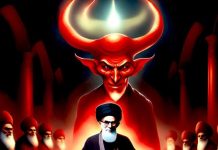ISIS using chemical agents not hard to believe
Raed Omari/Al Arabiya/August 18/15
There have been reports recently of the Islamic State of Iraq and Syria (ISIS) using poison gas in Iraq’s Kurdish-controlled areas. Though as yet unconfirmed, such allegations are unsurprising. The White House said it was investigating the matter. In July, two UK-based organizations – Conflict Armament Research and Sahan Research – said ISIS had used devices filled with chemical agents in late June against Kurdish forces and civilians in Hasakah province in northern Syria, and against Kurdish military positions near Mosul dam in northern Iraq. The findings followed reports of ISIS using suicide bombs and improvised explosive devices including chlorine gas and other substances, and may seek to exploit the use of chemicals while developing new weapons.
The UK-based Syrian Observatory for Human Rights (SOHR) said it had documented the use of projectile-delivered chemical agents by ISIS in an attack on a village near Tel Brak, Syria, on June 28. It said 12 Kurdish fighters had been exposed to the gas. The SOHR also said it had received information about the gas attack in Hasaka, but gave no further details. Days before ISIS’s alleged chemical attacks in late June, Australian Foreign Minister Julie Bishop said: “The terrorist group is prepared to use any and all means, any and all forms of violence they can think of, to advance their demented cause.” She added that ISIS had recruited “highly technically trained professionals” to develop chemical weapons, and had already used chlorine as a weapon. Iraqi officials and Kurds have made similar allegations. In March, Kurdish officials accused ISIS of a chemical attack against Kurdish fighters on a road between Iraq’s second-largest city Mosul and the Syrian border, as Kurdish forces fought to seize a vital supply line used by ISIS.
Evidence
With a lack of well-documented information about its activities and brutality – except what it publicizes – testimonies of locals under its rule or of those forced to leave are the only source of information. Despite a lack of conclusive evidence, however, ISIS has displayed unsurpassed brutality, and is present in countries that had chemical weapons industries and still have remnants of such hazardous substances on the black market or in abandoned chemical weapons plants.
Concerns first surfaced in July 2014 following ISIS’s capture of a former chemical weapons plant in Al-Muthanna, east of Baghdad, which was thought to have small quantities of precursor chemicals and badly damaged chemical munitions left after U.N. inspections in the 1990s. ISIS has no red lines when it comes to its brutal treatment of civilians and prisoners of war. In addition, why should it be concerned about breaking international law when other chemical attacks have gone unpunished? Phrases such as “international law” and “international community” are not present in ISIS’s lexicon. Manufacturing primitive chemical weapons is not difficult, particularly in ISIS’s case since many of its fighters have science degrees and are ex-Baathist officers with military experience. After all, it was not hard for the Japanese Aum Shinriko movement to manufacture and unleash sarin gas on the Tokyo subway in 1995.
New Arab order should make meritocracy its priority
Khaled Almaeena/Al Arabiya/August 18/15
The Arab world is passing through its darkest phase in history. Even the most diehard optimist would find little to cheer about. Arab political pundits and newly self-appointed social media analysts have come up with many theories, mostly bizarre, for the predicament we are in. They blame everyone under the sun but have not bothered even to give a cursory glance at what has led us to this sorry situation. Let’s be frank. All what has happened to us is of our own doing. Right from the so-called Arab independence movement through post independent stages, most Arab leaders failed their people as self-appointed generals, presidents for life and others were more focused on consolidating power through oppressive measures rather than uplifting their population. I grew up hear messages blaring on radios haranguing Arab masses, and highlighting imperialistic plans to gobble up the Arab world.
We saw a number of coups and counter coups, and the slaughter of thousands of innocent people because the new general was suspicious of them. But even then there was always hope. However, today there is almost no light at the end of the tunnel. Bomb blasts, beheadings, massacres are a daily feature of our news diet. The Arab Spring, which was supposed to usher hope, has engulfed us and thrown us in the dark recesses of a world that has turned into a tumultuous frenzy, while prompting some Arab states to take sterner measures to stifle dissenting voices.
Learn from your own history
Can we continue like this? The answer is an emphatic no! Arab states should take examples of other states where discipline was maintained but voices were heard. Singapore and South Korea are but two examples that have shown there can be no progress without a free and responsible press. There can be no viable state if the leader does not lead from the front, implements good governance, demands accountability and transparency beginning with himself and leads the change against corruption.
Bomb blasts, beheadings, massacres are a daily feature of our news diet. The media should be viewed as a partner and the ruler should know that criticism would be constructive and can serve the state. That is the role of journalists to alert the state of the shortcomings. A society should be created where free flow of ideas and information could help create an atmosphere where the focus is on growth. A new Arab order should make meritocracy its priority. We have been damaged by years of nepotism and corruption. We have been hindered by the inaction and the incompetency of those in charge. We cannot afford to procrastinate.
Dangers lurk where there are gaps and vacuums in society, we should not allow this to happen. There should be trust between all members of society and Arab government. An atmosphere of trust and accountability should prevail for the state to progress, and in order to create trust we must put an end to the divisive ways practiced by a certain section to hold sway over society.
Women are an important segment of society and they should be allowed to play a leading role. The voices of extremist and obscurantists should not be allowed to drown the voices of those who seek progress. Provincialism, tribalism and ethnic favoritism should be eradicated totally from the minds of those in power. Arab governments should take a lesson from their own history. They cannot rule by sheer force and absolute control in an age of social media.
Also great advances in technology, where a chip can be planted in humans to read eachother’s thoughts, it will be futile to try to control the masses. The Arab people are like their peers elsewhere they want to live in peace and dignity. In today’s world it is inevitable that everyone works to achieve peace and all are accorded dignity. The sooner our leaders realize this, the faster we will develop and progress.



















